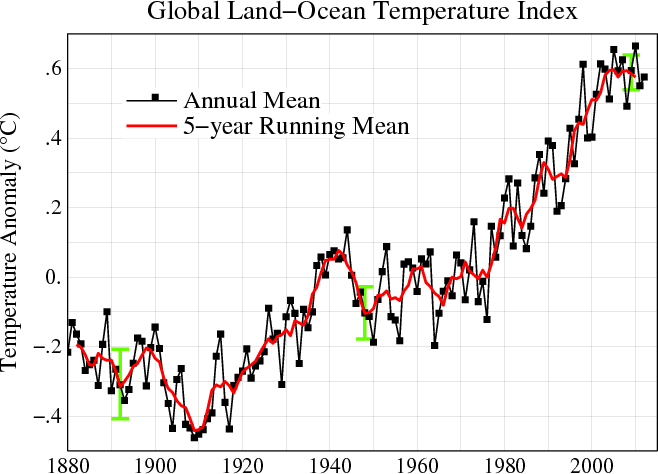What is Global Warming? -
Definition and Facts of Global Warming
What is Global Warming?-
A simple way of answering "What is global warming?" is - the observed increase in the average temperature of earth’s atmosphere and oceans over the last few centuries and its predicted continuation in the future without preventive measures. It has observed that earth’s average temperature has risen about 0.8 degree centigrade (1.4 degree Fahrenheit) since the late 19th century (Refer to the Global Land-Ocean Temperature Index graph)

Source: Nasa -GISS
Scientist discovered
that, as the Earth moved out of ice ages over the past million years, the
global temperature rose a total of 4 to 7 degree centigrade over about 5,000 years. In the
past century alone, the temperature has climbed 0.7 degree centigrade, roughly
ten times faster than the average rate of ice-age-recovery warming (Source: NASA).
Majority of the scientist and scientific bodies of the world agree to the fact that global warming has resulted due to enhanced greenhouse gas effects, mainly caused by human activities such as fossil fuel burning for energy, industrial processes, transportations and deforestations. Scientific models predict that, if the usage of fossil fuel and green house gas generation continue following the current trend, the average surface temperature of earth can rise between 2 to 6 degree centigrade by the end of 21st century.
Global warming has far greater impact on overall earth’s ecosystem and environment than just increase in the surface temperature. Melting ice caps and glaciers, increased typhoon and tidal waves, modified rain fall patterns, draughts and longer growing seasons are few such phenomena resulted from global warming. Weather isn’t the only thing that gets impacted by global warming. Rising sea levels is another alarming cause that will erode coasts and will cause more frequent coastal flooding. If global warming continues it is expected that some of the island nations will be disappeared. The problem is serious because up to 10 percent of the world’s population lives in such vulnerable areas less than 10 meters above sea level (Source: NASA). People living on the low laying coastal areas will get the hardest hit. In addition, as tropical temperature zones expand, spread of some infectious diseases like malaria will also increase.
In general, global
warming is affecting and will continue to affect our life and ecosystem on earth
in many ways. But we can control the extent of these impacts by slowing down
our fossil fuel burning and green house gas emissions. So the future of global
warming and its impacts on our life will depend on the choices we make now.
Learn More on Global warming with this National Geographic Video
(source: Global Warming 101 by National Geographic):
Click here to learn more on "What is Global Warming?"
Go Back to Home
Total Visits to Site: